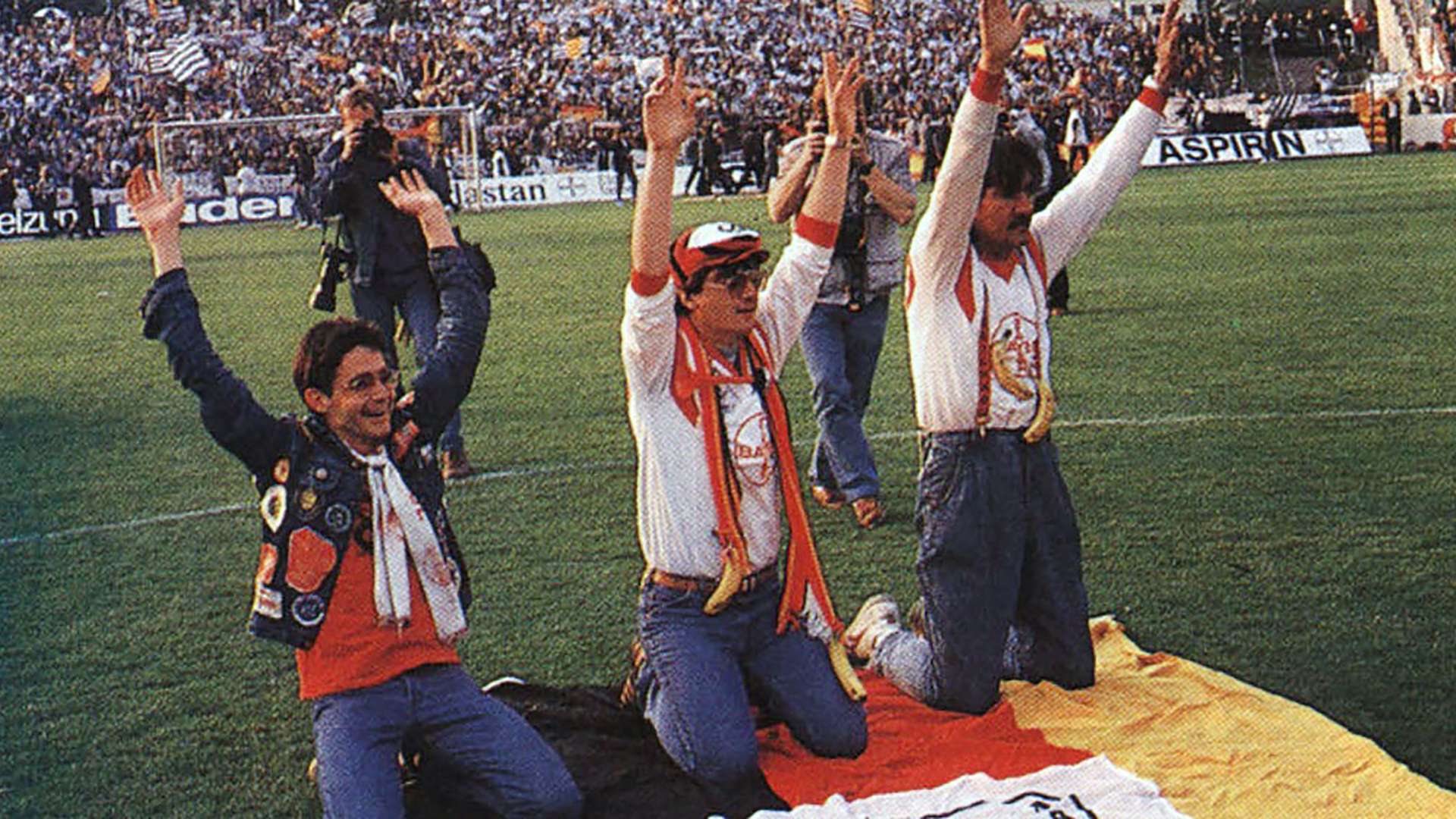Triumphs and Tears under the Cross
Long since one of Europe’s top clubs
Bayer 04 is celebrating its 120th birthday this year. To mark the occasion, we’re taking a regular look at football under the Cross on bayer04.de and primarily delving into the question of how we became the club we are today? Part four of our series looks at the success of the past decades, but also at some painful defeats.
Perhaps the recent narrow victories at Augsburg and RB Leipzig were particularly significant. Particularly impressive. Particularly valuable. Because in addition to all the footballing ability, they also revealed the character of this team once again. And perhaps that's why Jonas Hofmann found such emotional words after the 1-0 win in Augsburg. “The belief in victory was huge. The morale, the commitment, the mentality of this team - it's all admirable. My heart is still pounding. These are feelings of happiness that you rarely experience.”
It was Exequiel Palacios' goal in the final minute of stoppage time that triggered that feeling of happiness. It saw Bayer 04 complete the best first half of a season in the club's history, tallying 45 points, 47 goals scored, 12 conceded. The only team to ever boast a better record after 17 matchdays in Bundesliga history was Bayern Munich, who once achieved 47 points in 2013/14 and 46 in 2015/16. It is the third time after 2001/02 and 2009/10 that the Werkself have finished the first half of a season on top, and the second time after 2009/10 without a single defeat.
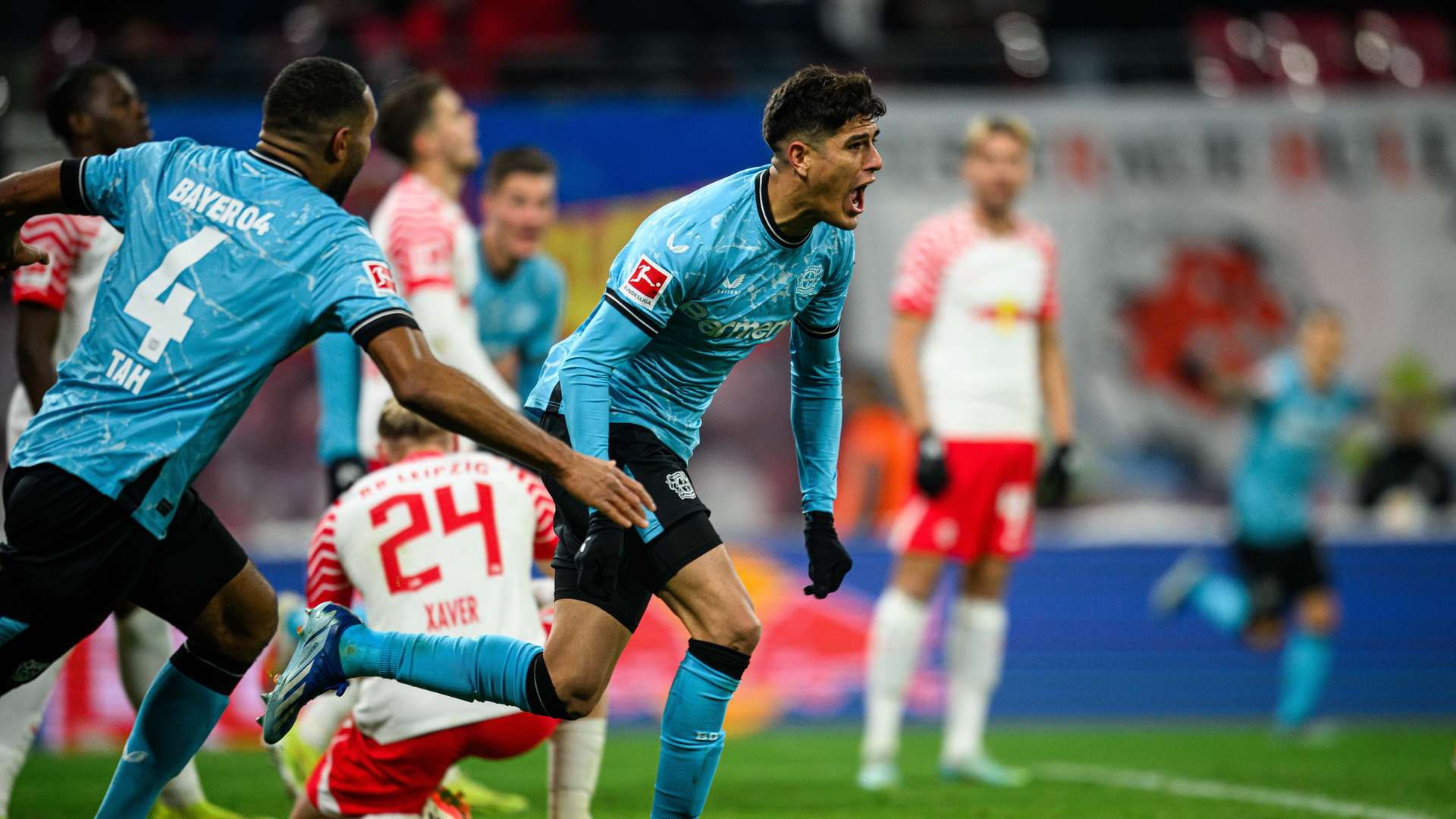
The streak has continued into the second half of the season. And again, it was a last-minute goal by Piero Hincapie that gave the Werkself a 3-2 win in Leipzig after trailing twice. Overall, Leverkusen have remained unbeaten in all 28 competitive matches this season and have already recorded more league victories than in the entire previous campaign (15). Impressive figures wherever you look. And yet nothing has been won yet. But the path the team has taken under coach Xabi Alonso is already inspiring. When was the last time a Leverkusen team created such euphoria under the Cross? You probably have to go back to the 2001/02 treble runners-up season, when a similar atmosphere prevailed.
THE MOTHER OF ALL TRIUMPHS
Nevertheless, Bayer football experienced countless great moments before the turn of the millennium and in the two decades that followed. Let's start with the mother of all triumphs - promotion to the Bundesliga almost 45 years ago. From a black-and-red perspective, the 1978/79 campaign has astonishing parallels to the current season. After 17 matchdays, coach Willibert Kremer's team had the same record in the Bundesliga 2 North division at the same stage as today’s Werkself in 2023/24, with 14 wins, three draws and an almost identical goal difference of 45-11. Jürgen Gelsdorf, Thomas Hörster and Co. also set a new record in German football and were the first professional team ever to remain unbeaten in the first half of a league season. No Bayer fan, however optimistic, would have dared to dream of this before the campaign.
“Nobody had our team on their radar, and then all of a sudden they stormed through the league,” even coach Kremer marvelled in retrospect. Reiner Calmund, who was still responsible for the youth department at the time, later described promotion as “a positive industrial accident”. Bayer 04 got the last point they needed on 13 May 1979 in the legendary 3-3 draw against Bayer 05 Uerdingen - thanks to a comeback from 3-0 down. The subsequent celebrations with the fans turned into the first really big party in the club's 75-year history. Calmund remembers: “When it was done, all hell broke loose. We cheered, we howled, we drank and turned night into day. And when we woke up, we wondered about our thick skulls and thought: ‘Oh, what are we going to do now?’”
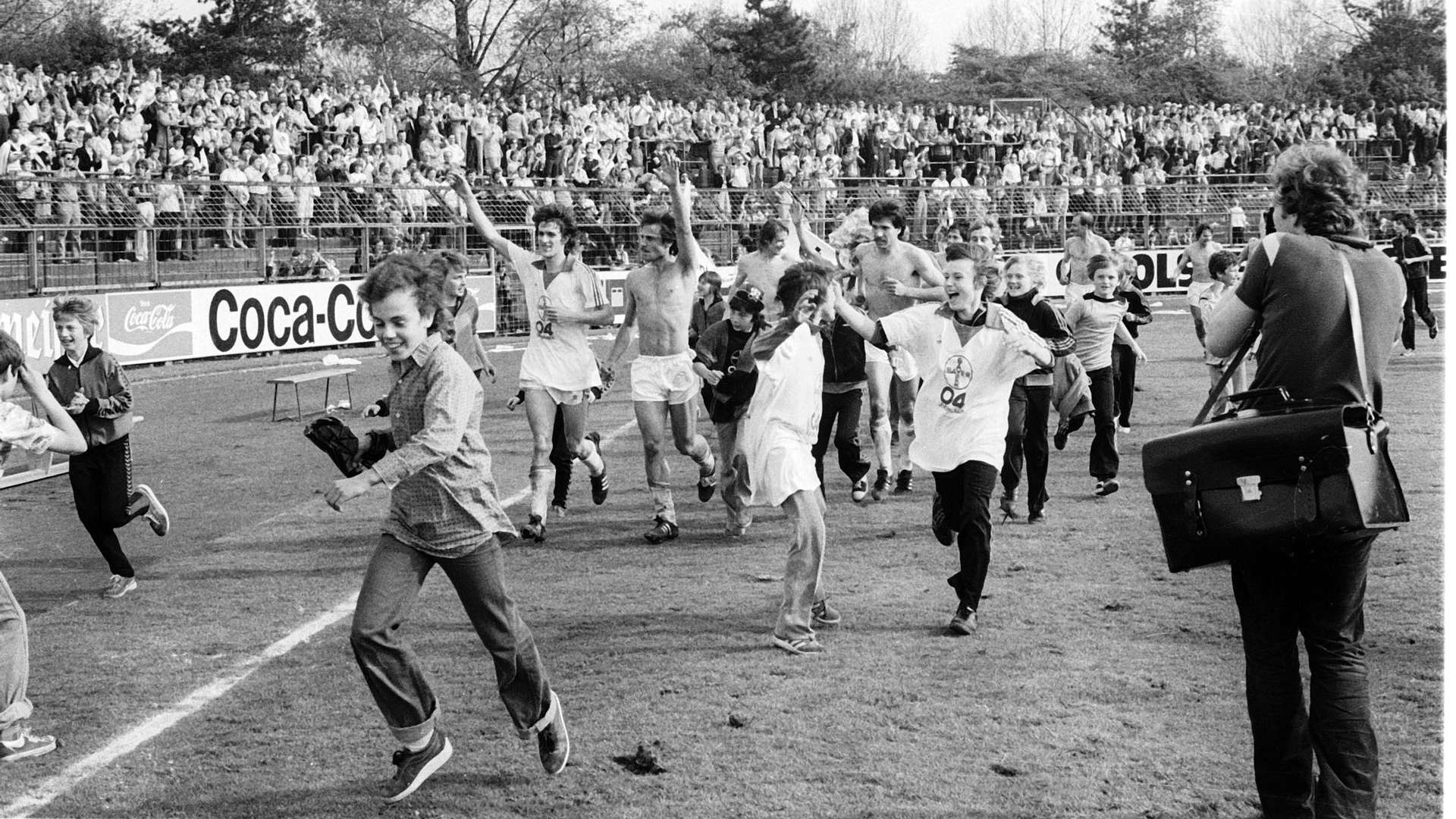

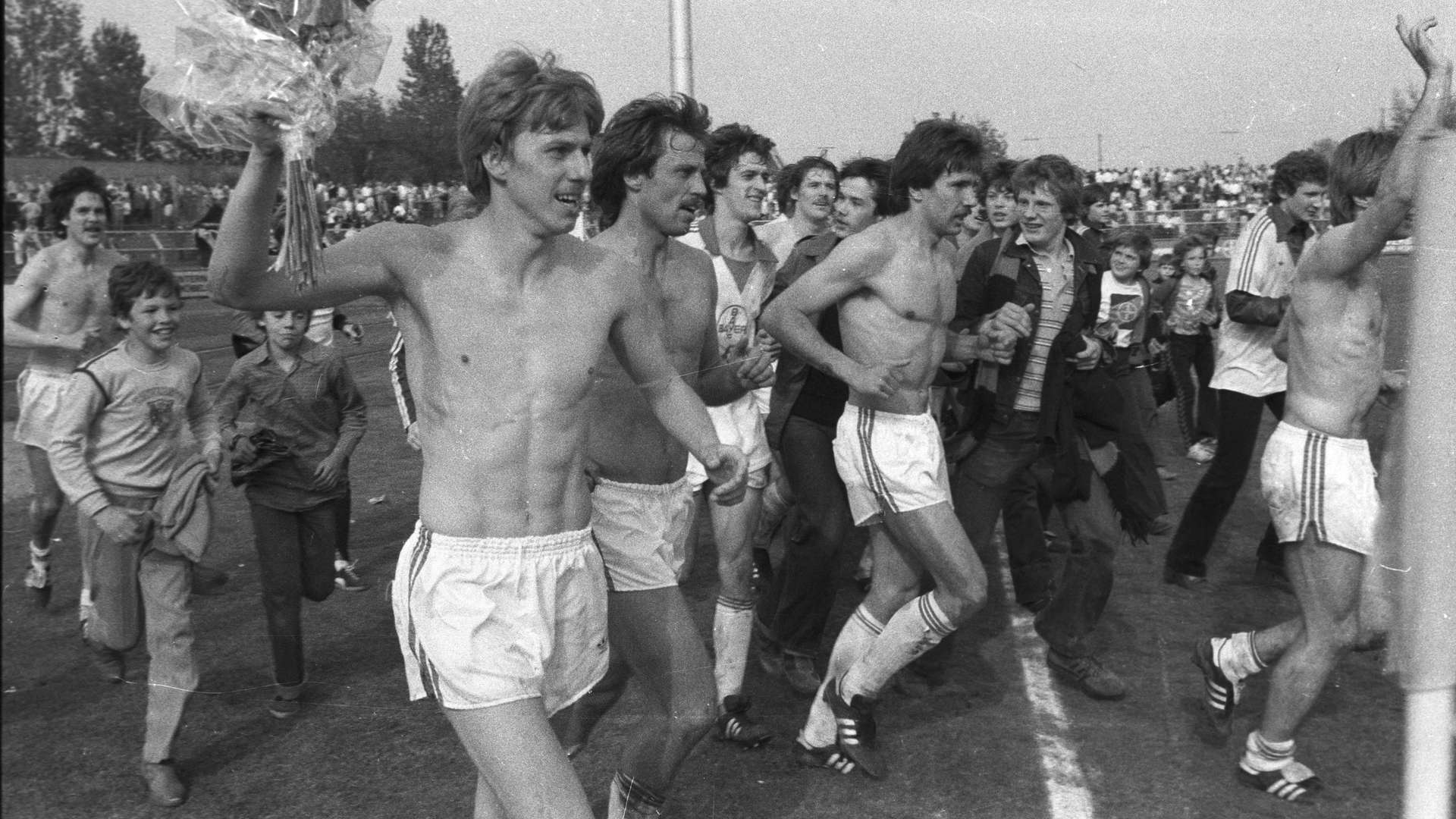
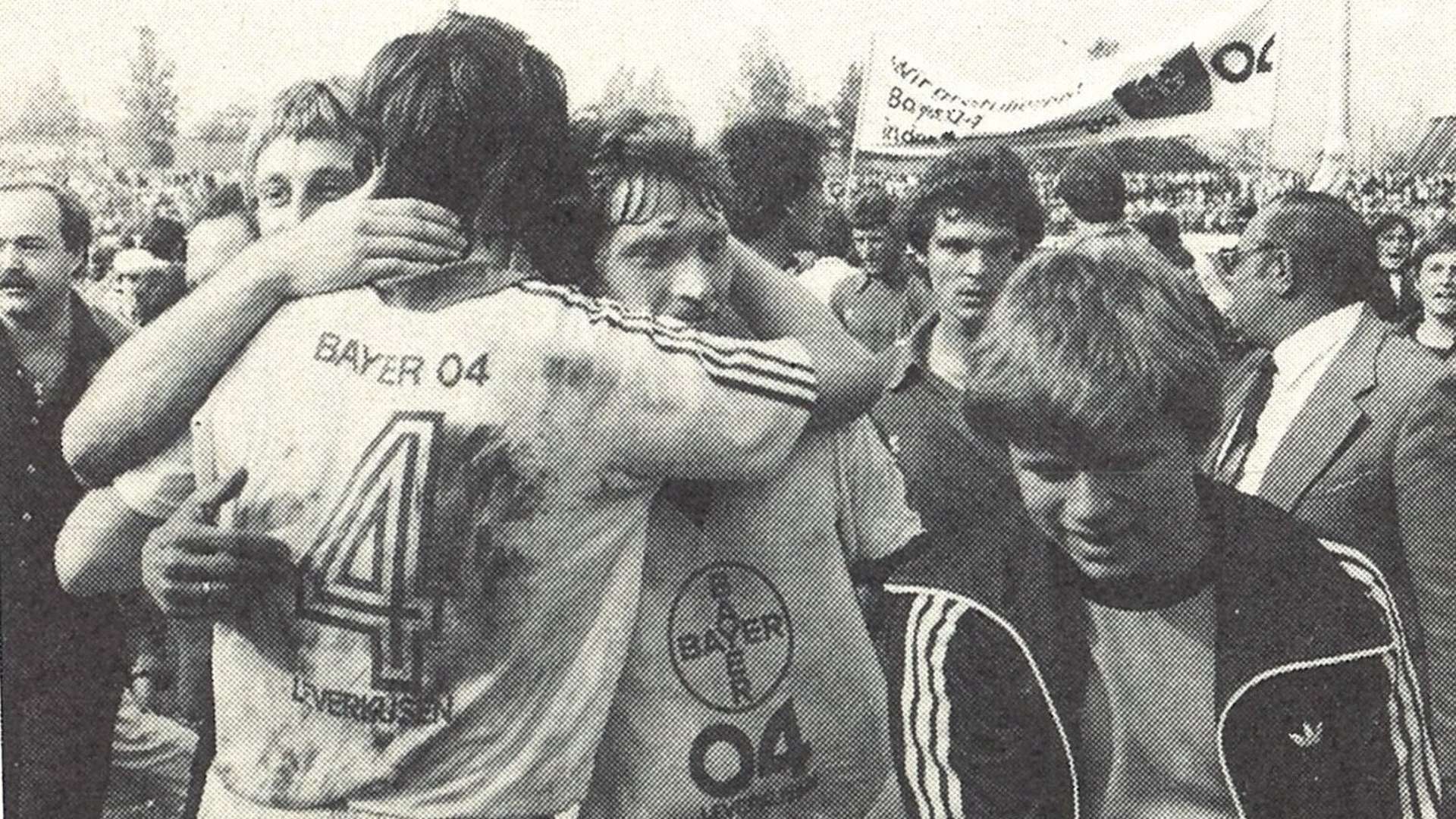
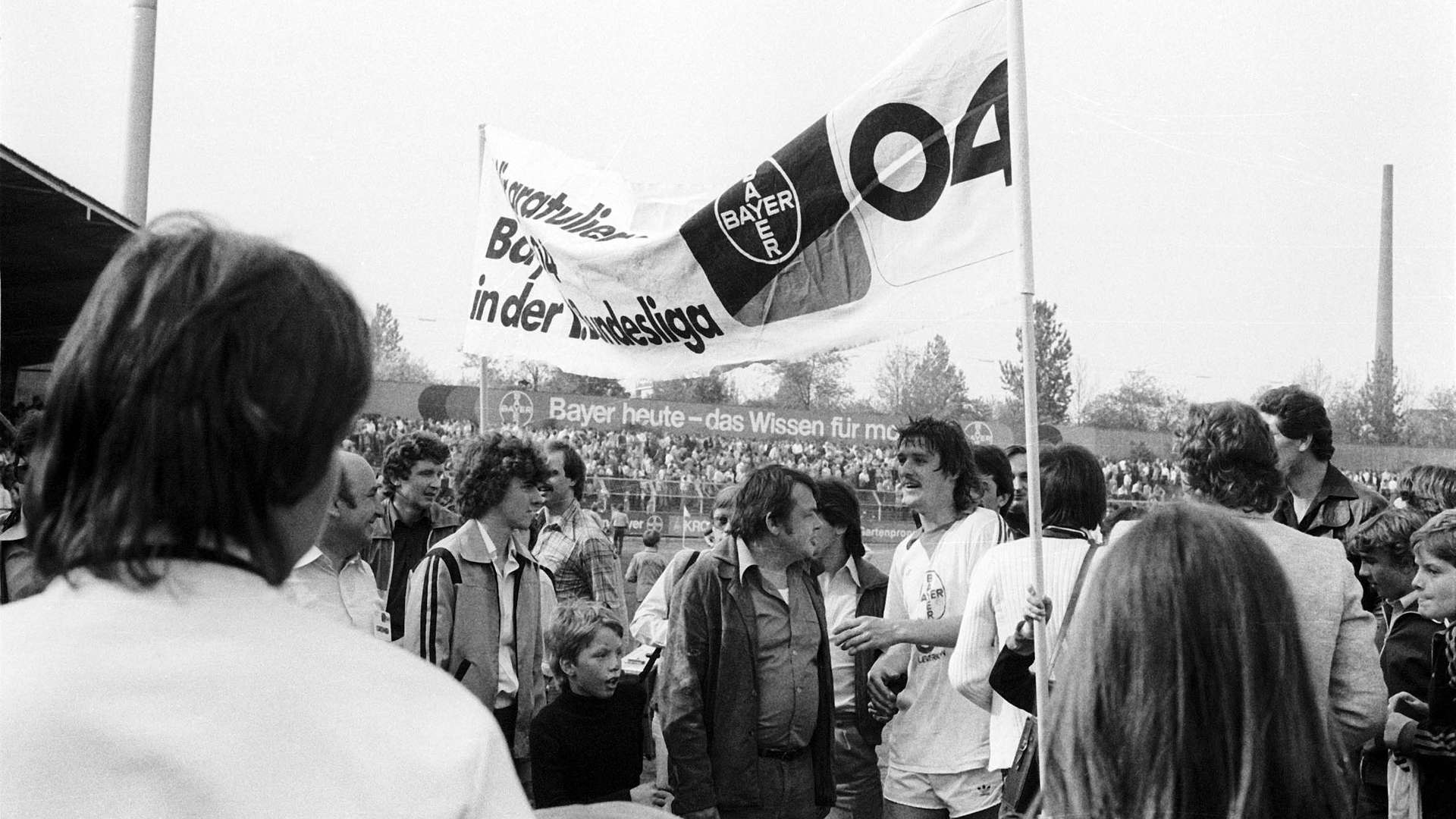
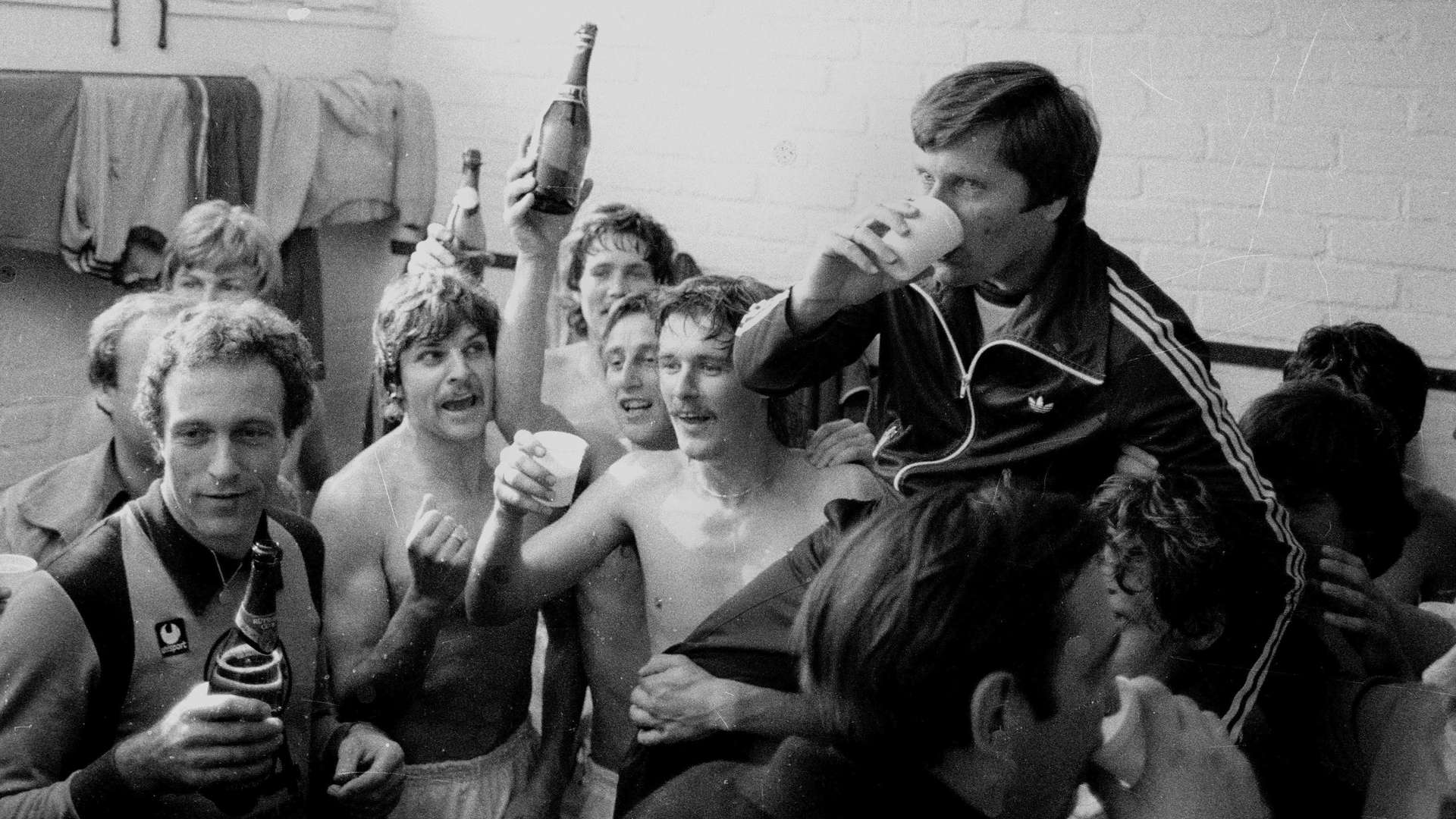
Well, quite simply, they were now playing in the Bundesliga. Bayer 04 suddenly became the 35th club to join the elite of German football since the league was founded in 1963. However, it cannot be said that the underdogs from Leverkusen immediately shook up the league. On the contrary, they were stumbling badly after just three years. With two wafer-thin victories in the relegation play-off matches against Kickers Offenbach (1-0 and 2-1), the Werksklub stayed in the league in 1982. In Dettmar Cramer, Bayer 04 had meanwhile hired its first world-renowned coach. However, even under the charismatic little man with the high forehead, there was no resounding sporting success. It was only under Erich Ribbeck that the club established itself in the top third of the league. The Werkself finished sixth in the table and qualified for European competition for the first time in 1986. The fact that almost the same team won the UEFA Cup just two years later was at least as big a sensation as Bundesliga promotion nine years earlier.
1988 UEFA Cup: “The game of our lives”
Austria Vienna, Toulouse, Feyenoord - even the first opponents in the knockout rounds were notable names. But then things got really tough with the games against Barcelona ‘at home’ in Cologne (0-0) and at the Camp Nou, where Tita scored the golden goal to win 1-0. Then followed the battles in the semi-finals against then Bundesliga giants Werder Bremen, in which a goal from defender Alois Reinhardt was enough to take the team to the final. And finally the two legs against Espanyol, starting with the shock of the 3-0 defeat in Catalonia before the second leg of the final on 18 May 1988 in front of a fantastic crowd at the Ulrich-Haberland-Stadion construction site. Still no goals at the break, but then Tita and Falko Götz ensured a nervy, grandstand finish, a sense of hope – and then the roar after Bum-kun Cha made it 3-0. Goalkeeper Rudi Vollborn was the hero in the penalty shootout, with numerous supporters already on the pitch. Images and moments that have burnt themselves into the collective memory of Bayer 04 fans. “It was the game of our lives for all of us,” said Herbert Waas later. Coach Ribbeck was a little more sober: “We made a name for ourselves in our second UEFA Cup season both in Germany and abroad.”
1993 DFB-Pokal: Triumph in Berlin
And yet, the plain Jane image stuck with Bayer 04 for a while. The first and so far only continental title was followed five years later by the first and so far only domestic crown. Leverkusen had already eliminated their strongest opponent in the semi-finals. “Eintracht Frankfurt played the best and most beautiful football in the league back then, but we just had a really good day,” said Ioan Lupescu in retrospect. The midfield strategist was one of the best players for the visitors from Leverkusen in the 3-0 win. Andreas Thom, who scored two goals, also put in a world-class performance.
The final in Berlin's Olympiastadion against the Hertha Berlin second team on 12 June 1993 was a thankless task. “Just under 10,000 Leverkusen fans against 66,000 Berliners - we were booed mercilessly every time we had the ball,” recalls Berlin-born Vollborn. “But I didn't care at all that we were playing against a Berlin team in Berlin. I just wanted this trophy, nothing else.” Vollborn knew what it felt like to lift a trophy. He was the only member of the team who had previously won the UEFA Cup with Bayer 04. Ulf Kirsten, who had become the Bundesliga's top scorer for the first time in the 1992/93 season with 20 goals, finally headed the Werkself to a well-deserved cup victory in the 77th minute.
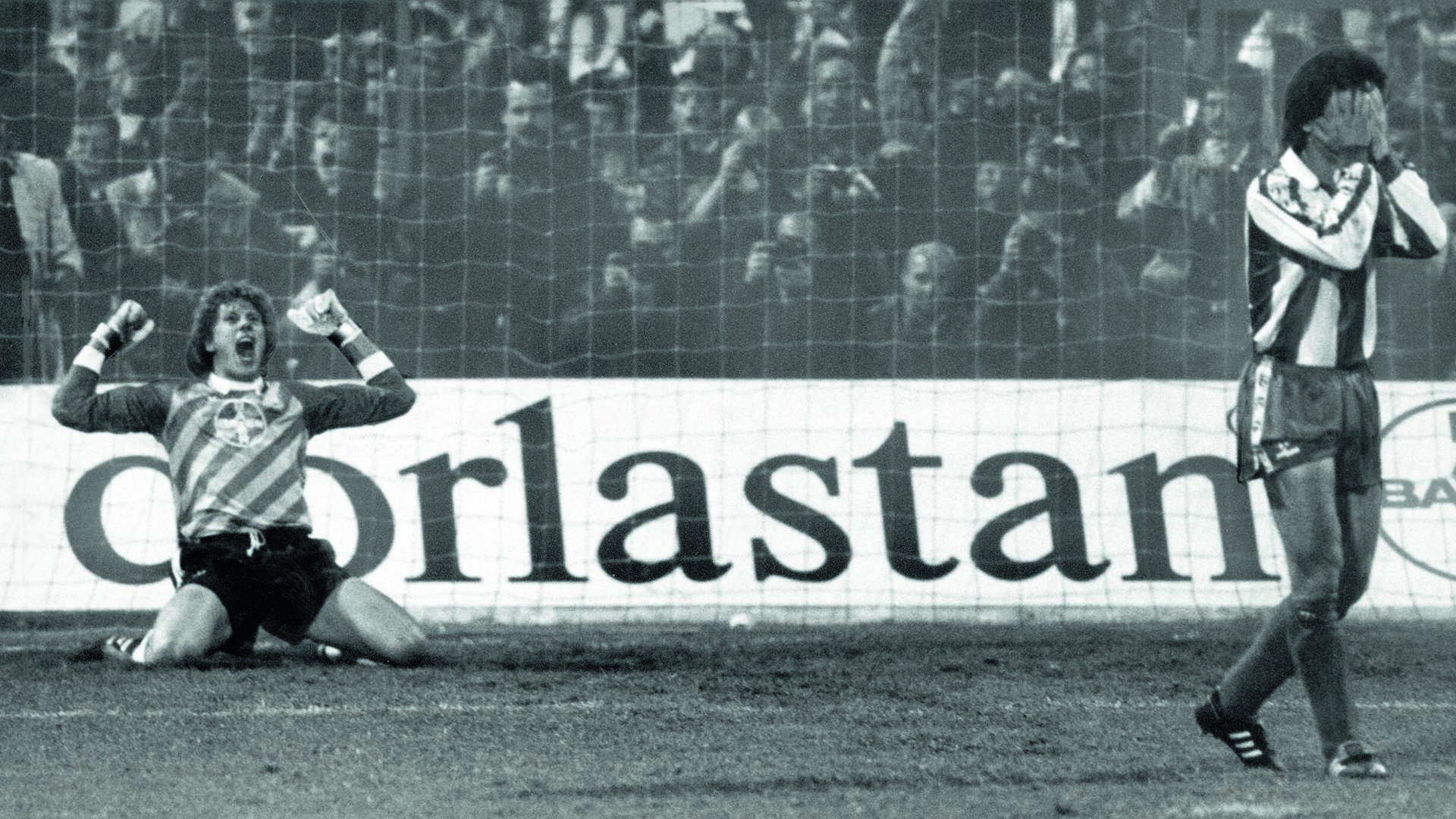

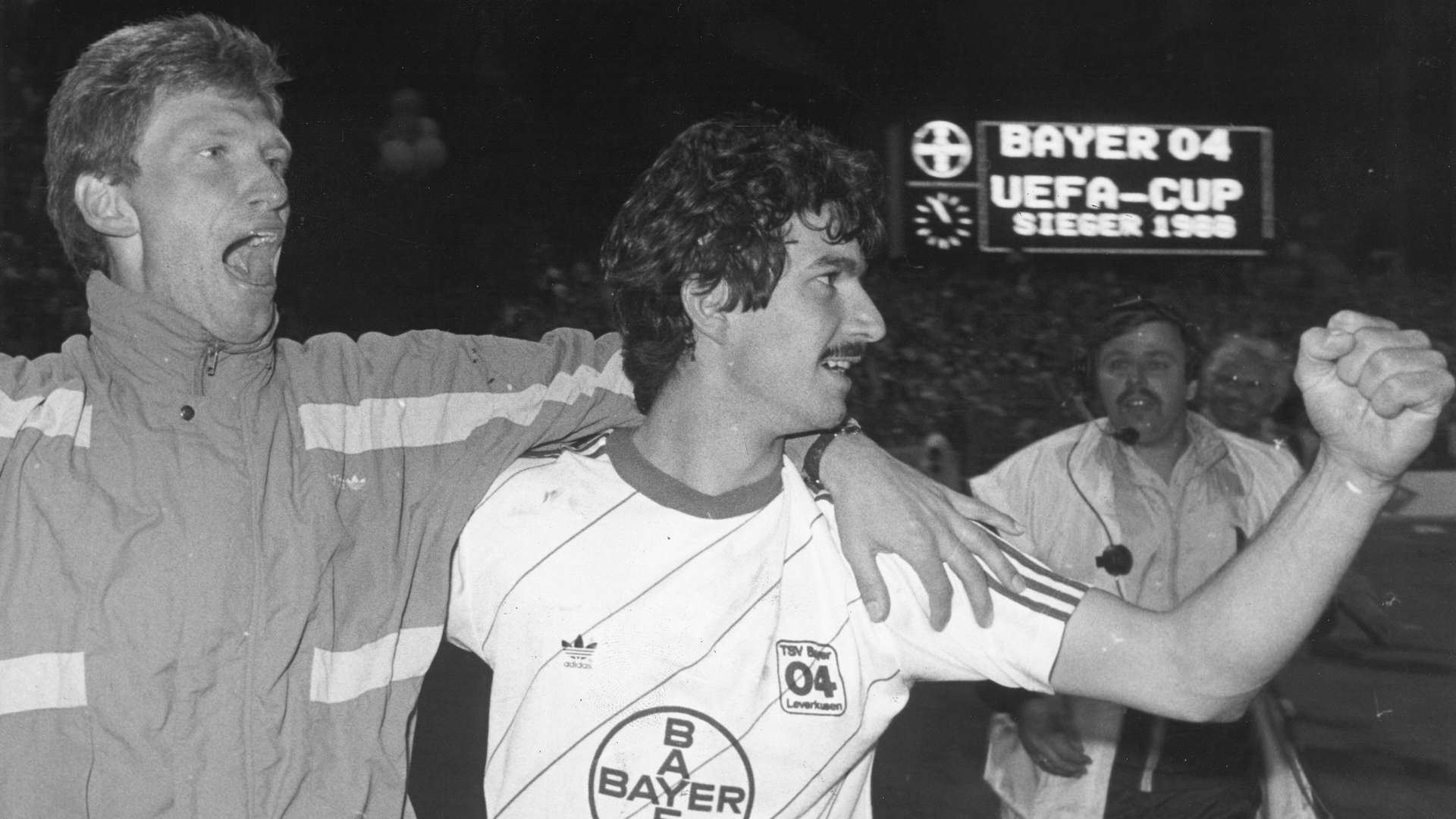
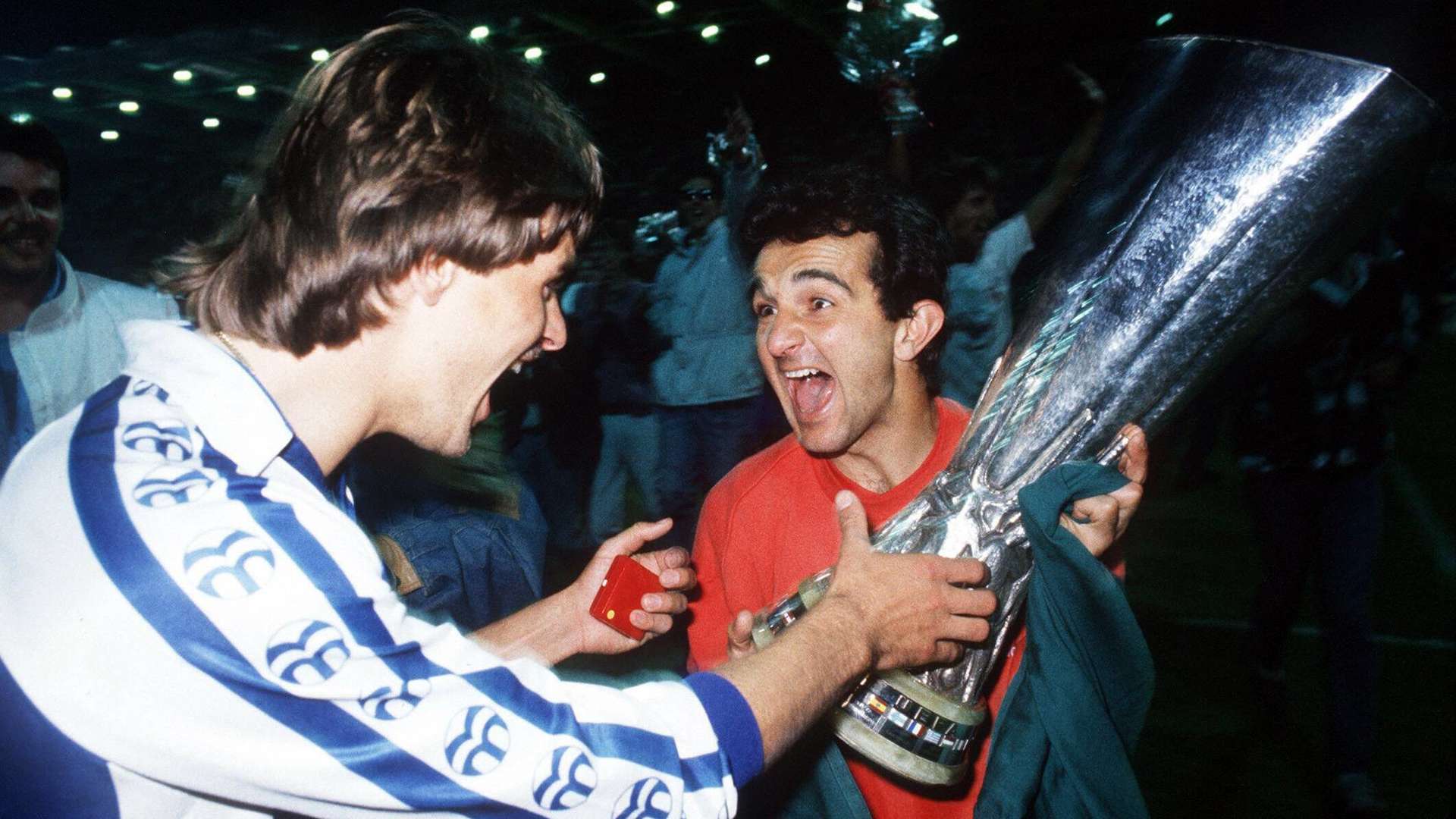
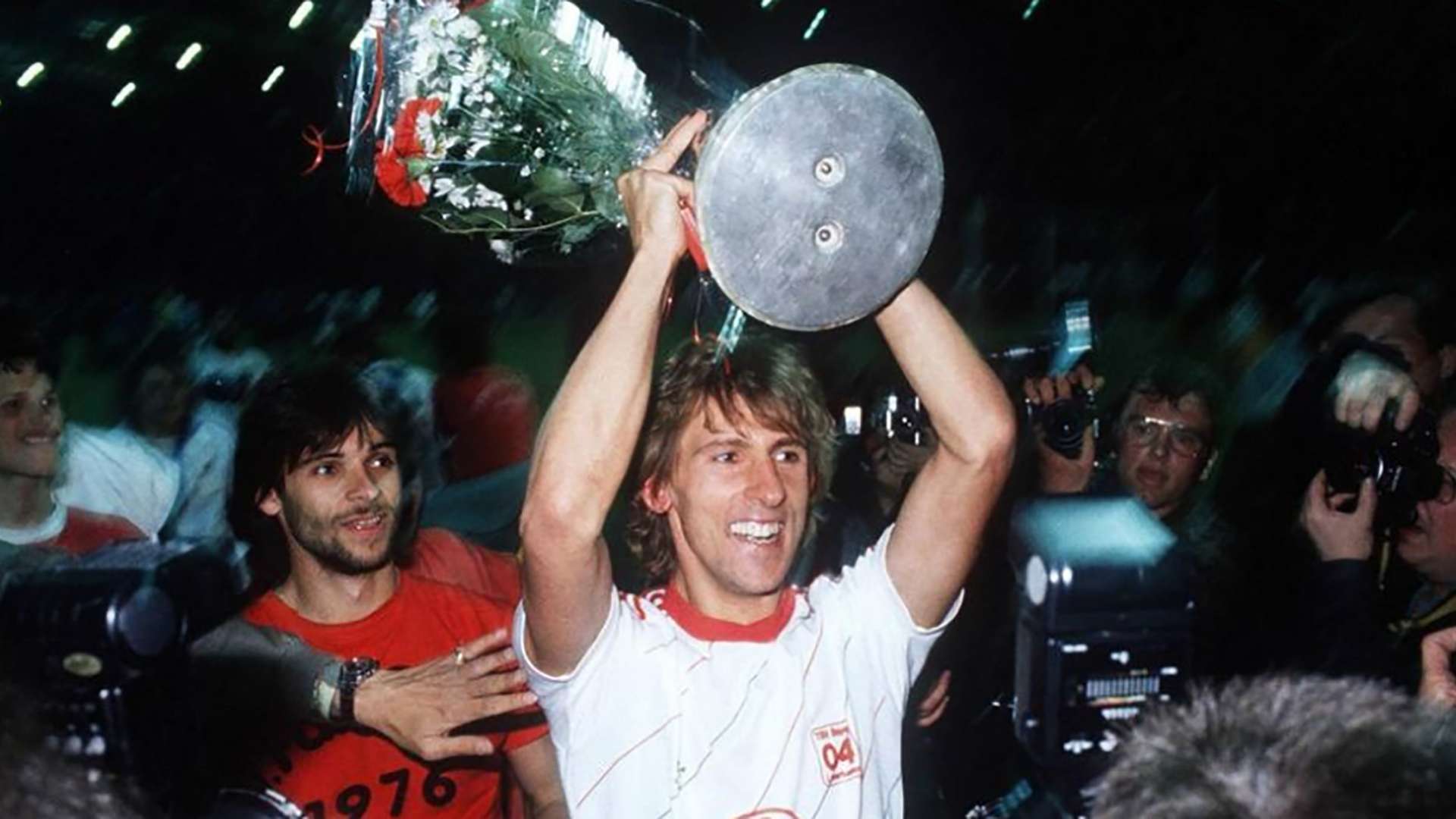
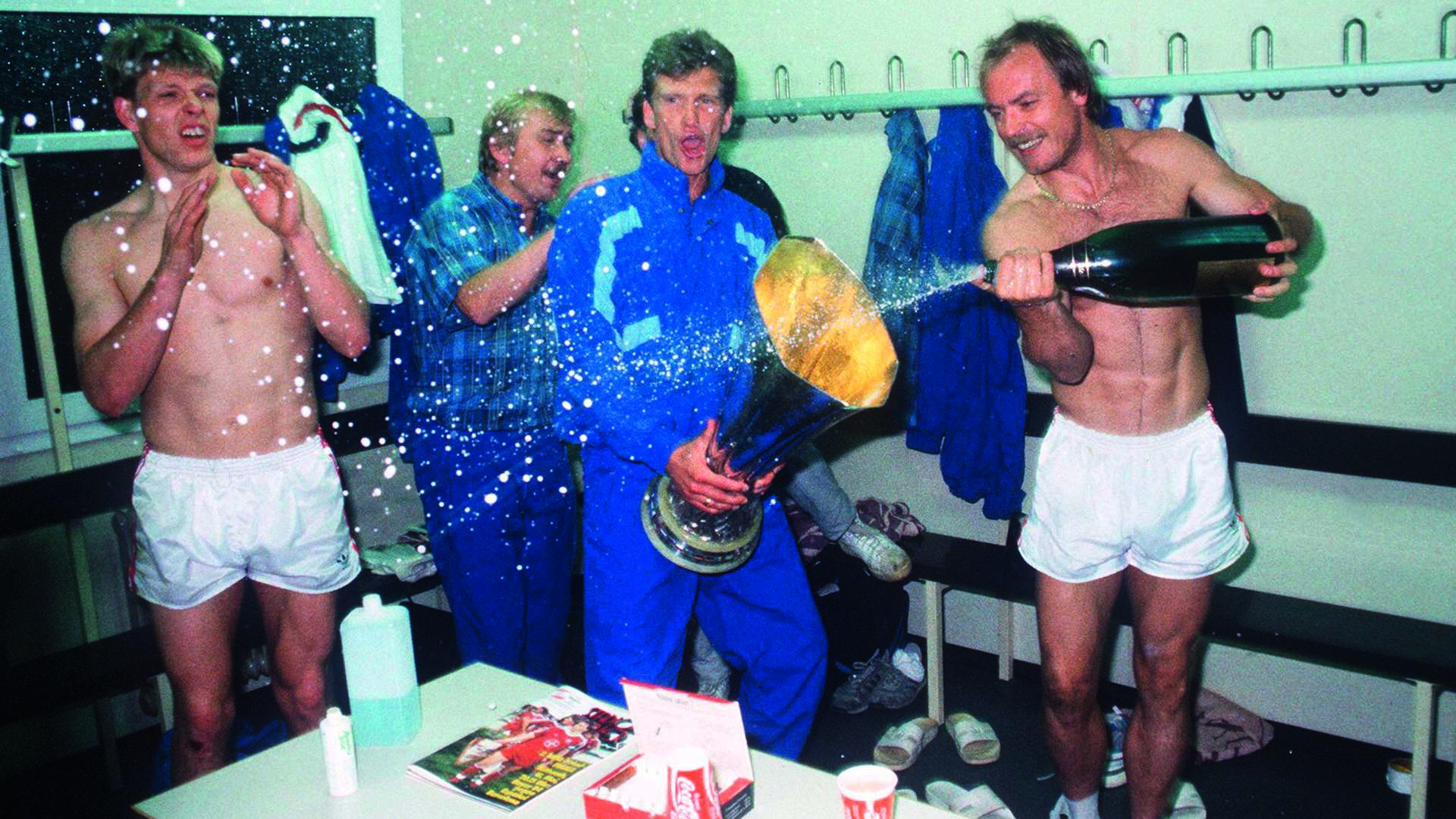
Perhaps the most important goal in the club’s history
As is well known, Leverkusen have not won any more titles since then. However, there have been plenty of great successes, memorable seasons and unforgettable games under the Cross in the 30 ensuing years. The 4-4 draw against Benfica in March 1994, for example, was thrilling, as was the spectacular 5-4 win against PSV Eindhoven just six months later with the emerging Ronaldo (the Brazilian), who scored three goals in that match – as did Ulf Kirsten for Leverkusen. In 1995, Bayer 04 reached the semi-finals of the UEFA Cup for the second time in the club's history. This time, however, the dream of reaching the final was quickly dashed as the Werkself were defeated by Parma of Italy in both games (2-1 and 3-0).
Just one year after their continental success, the Werkself almost came tumbling down in the Bundesliga. Nerves were on edge ahead of the last matchday of the 1995/96 season, which turned into a heart-stopping finale for Bayer 04 to avoid relegation. Eight minutes before the end, Kaiserslautern were leading 1-0 in Leverkusen and the Werkself had one foot in the second division. “Bayer 04 had never been this close to the abyss before or since,” said Rudi Völler, for whom this was the last competitive match of his playing career. Then Markus Münch came on and scored perhaps the most important goal in the club's history to make it 1-1 in the 82nd minute. Salvation at the very death. Pure relief. A deep breath. And as a consequence of this drama, a complete restart.
Champions League debut
Just a few weeks after the worst-case scenario was averted, a new era began at Bayer 04 under Christoph Daum. The coach, who was hired during the 1996 European Championship, led the Werkself to a runners-up finish in his very first season. In the end, they were just two points short of glory. From almost relegated to title contenders. Runners-up for the first time, qualified for the UEFA Champions League for the first time. There was such euphoria in Leverkusen. The team played inspiring attacking football, sweeping champions Borussia Dortmund aside 4-2 at the Ulrich-Haberland-Stadion right at the start, sending Bayern home with a 5-2 thumping (thanks in part to three goals from Markus Feldhoff) and celebrating a 4-2 victory in the derby against 1. FC Köln.
Bayer 04's Champions League story also began with a remarkable 6-1 victory against Dynamo Tbilisi in the first qualifying match. “We all enjoyed the feeling that we were now part of the crème de la crème,” recalls Hans-Peter Lehnhoff, who scored the first goal from a free-kick. Yes, the boys from Leverkusen had actually made it, could easily stomach a 1-0 defeat in the second leg and, after surviving the group stage, met Real Madrid for the first time in the quarter-finals. After a 1-1 draw at home and a 3-0 defeat at the Bernabeu, it was the end of the line against Los Blancos. But from then on, Bayer 04 were regulars in the Champions League. And they were to meet the Madrid giants several more times.
The trauma from U… We can’t even say it
During the Daum era, Bayer 04 established themselves among the top three in Germany and became the biggest rivals of Bayern and Dortmund. Only those two clubs have been in the Bundesliga without interruption for longer than Leverkusen, who are currently playing their 45th season. Speaking of Bayern… One match against the record champions is still one of the most memorable Bundesliga games ever for the Werkself. We’re talking about the 4-2 win on 30 November 1997 after trailing 2-0 and being a man down after Christian Wörns was shown red. Jan Heintze and a hat-trick from Ulf Kirsten turned the game around and took the roof off the Haberland Stadion. Up until the turn of the millennium, captain Jens Nowotny’s team produced a number of other exhilarating footballing celebrations. The 8-2 triumph in Mönchengladbach on 30 October 1998 and the 9-1 thrashing in Ulm on 18 March 2000 – Bayer 04's highest Bundesliga victory to date – are unforgettable.
Daum’s record at the helm was three runners-up finishes and one third place. Impressive. Even if Erik Meijer once claimed: “Nothing is sh*ttier than second place.” The Dutch striker's quote is certainly best suited to Leverkusen's third runner-up finish. Unterhaching. The word alone causes pain. The memory of the title, which was thought to be safe but lost, is even more painful. A trauma that probably triggered the longest stream of tears in Bayer's history on 20 May 2000. He himself cried like a puppy, Daum confessed looking back on the 2-0 defeat at Sportpark U...
“The football world bows down”
But let's move swiftly on from that. Let's get back to more pleasing matters. Just over a year later, in the summer of 2001, Klaus Toppmöller took over a team that was preparing to excite the whole of Europe. Yes, Bayer 04 were again at the top of the Bundesliga for a long time and the Werkself also reached the final of the DFB Cup for the second time. But it was above all in Europe where they caused a stir. Lucio, Bernd Schneider and Co. beat big clubs such as Barcelona and Lyon in the group stage of the Champions League. In the intermediate round, Juventus, Arsenal and Deportivo La Coruna were all astonished by Leverkusen, who at times played like they had been unleashed. And with the dramatic 4-2 victory in the quarter-finals against Liverpool, the “perfect football match”, as the outstanding two-goal scorer Michael Ballack called it, Bayer 04 could hardly avoid the compliments. “The football world bows down before this team,” wrote the Cologne newspaper Express. The head office received congratulatory letters from Formula 1 world champion Michael Schumacher and Campino, the singer of Die Toten Hosen and self-confessed Liverpool fan.
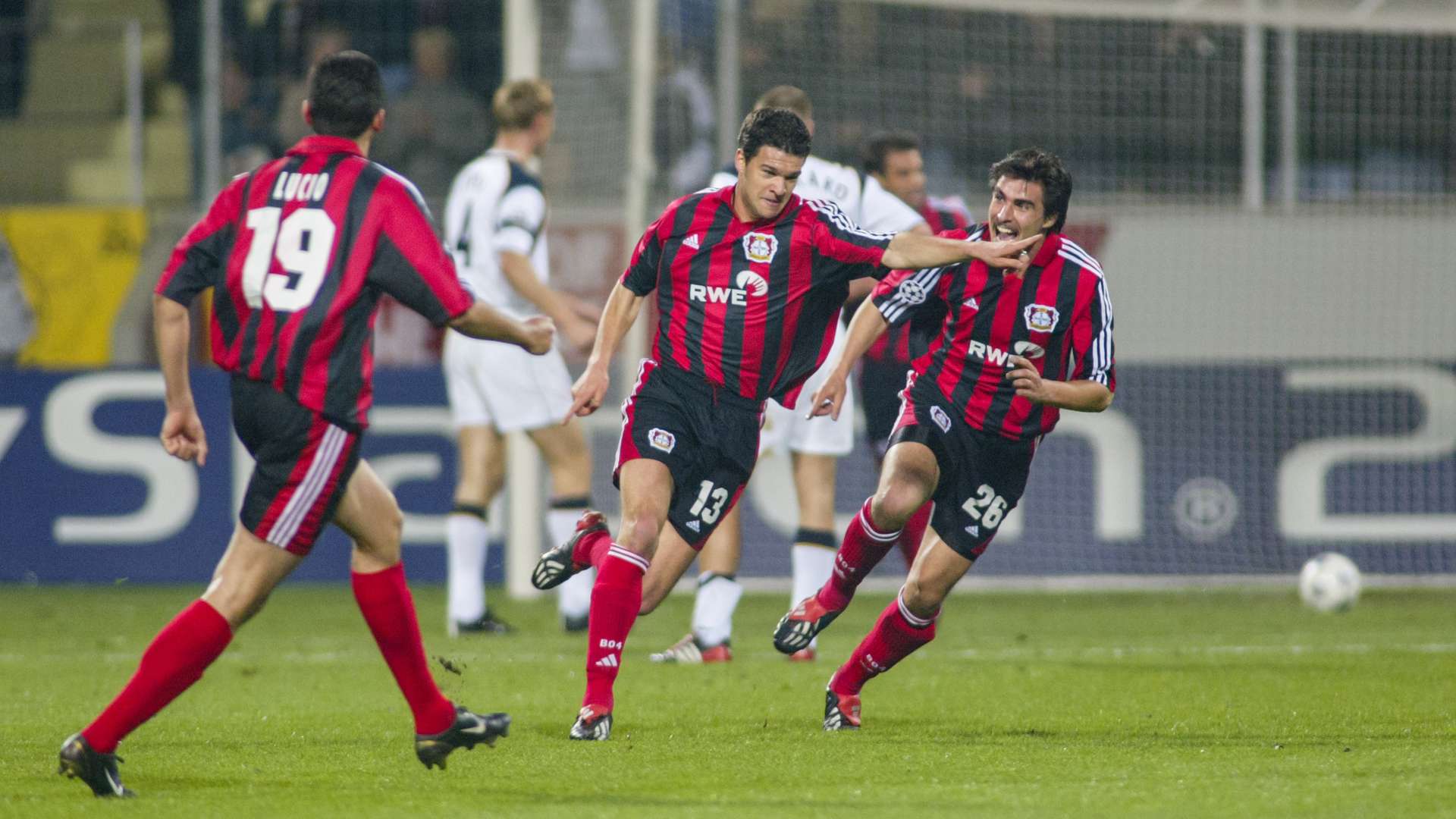

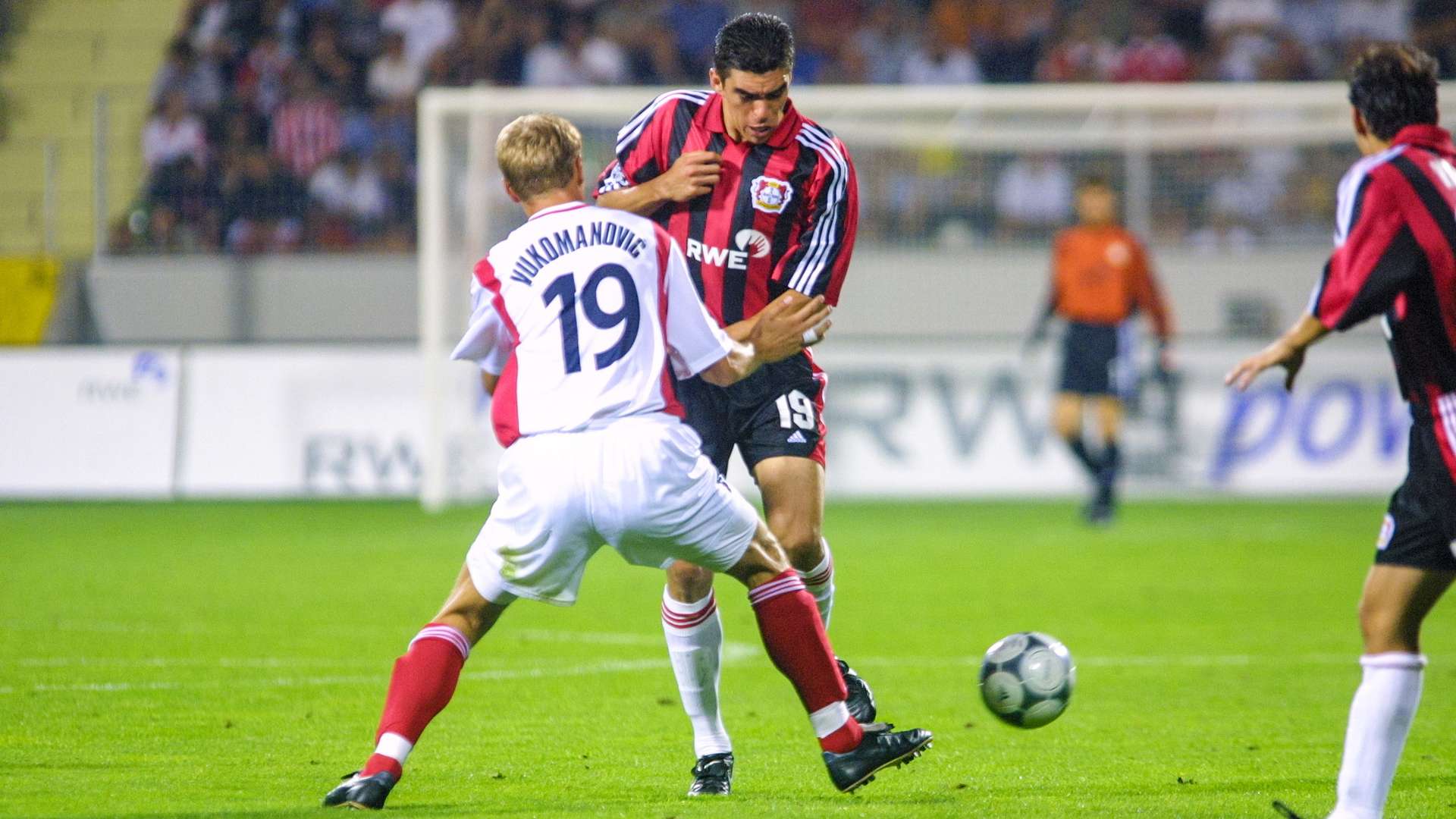
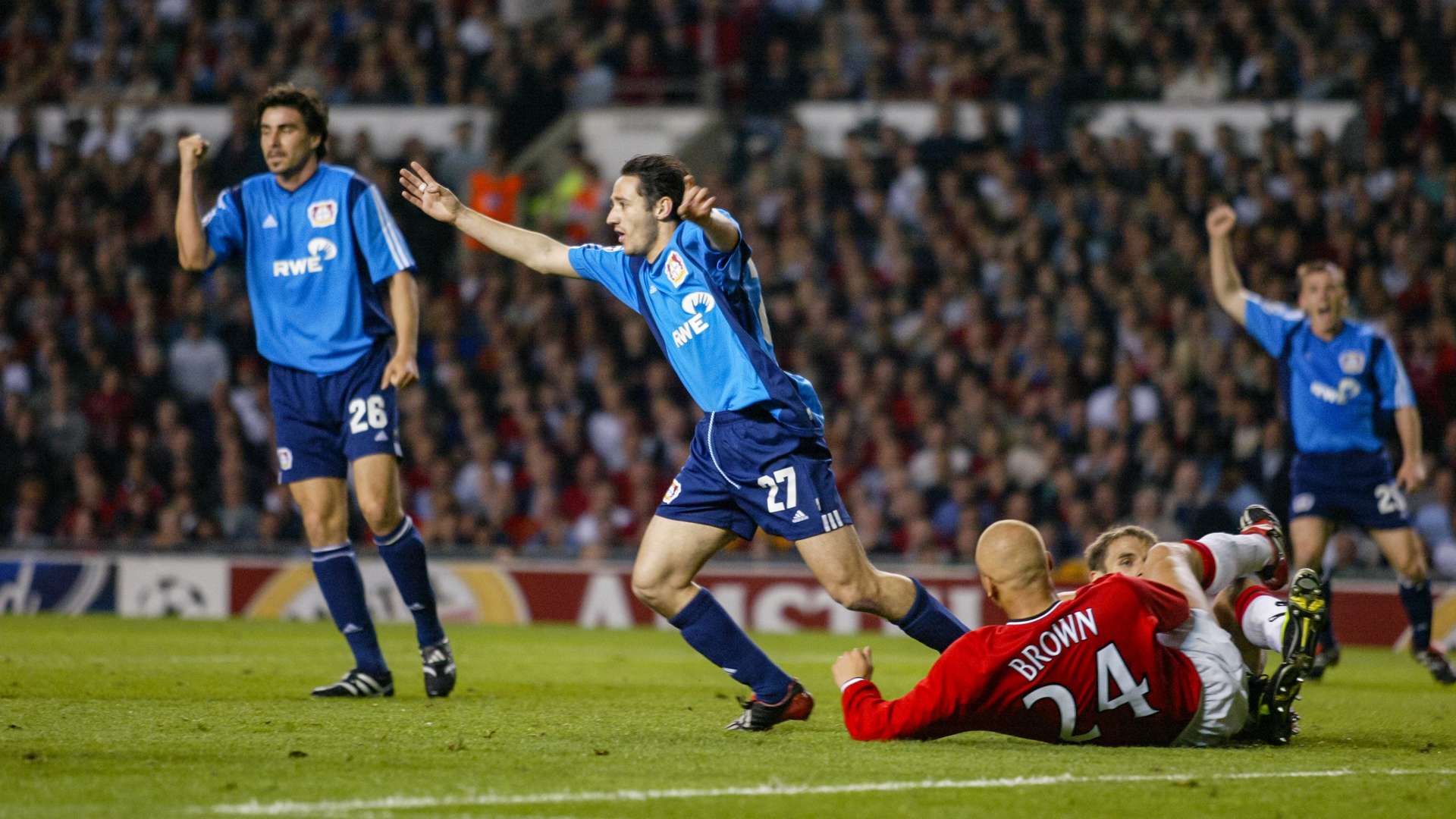
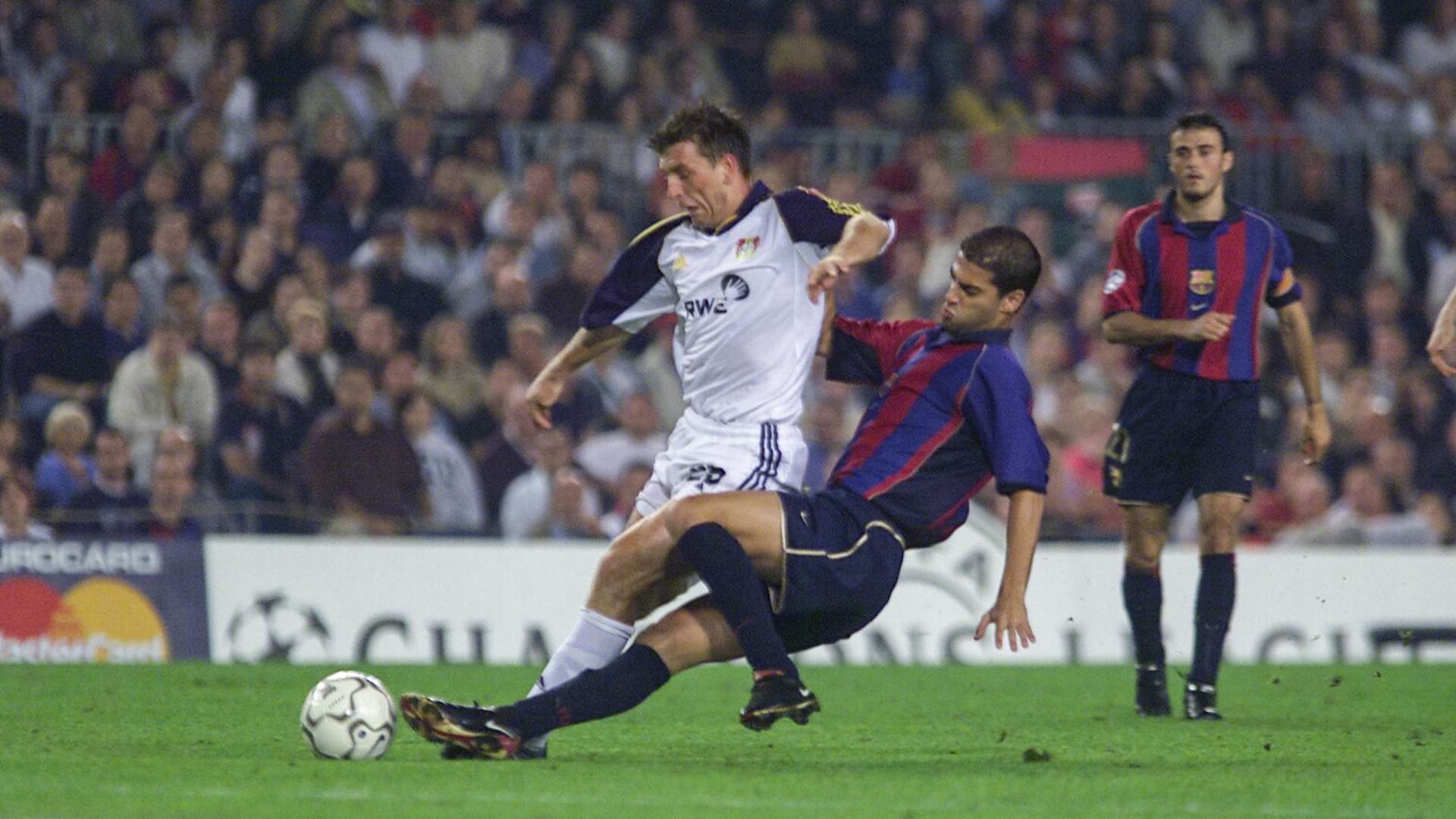
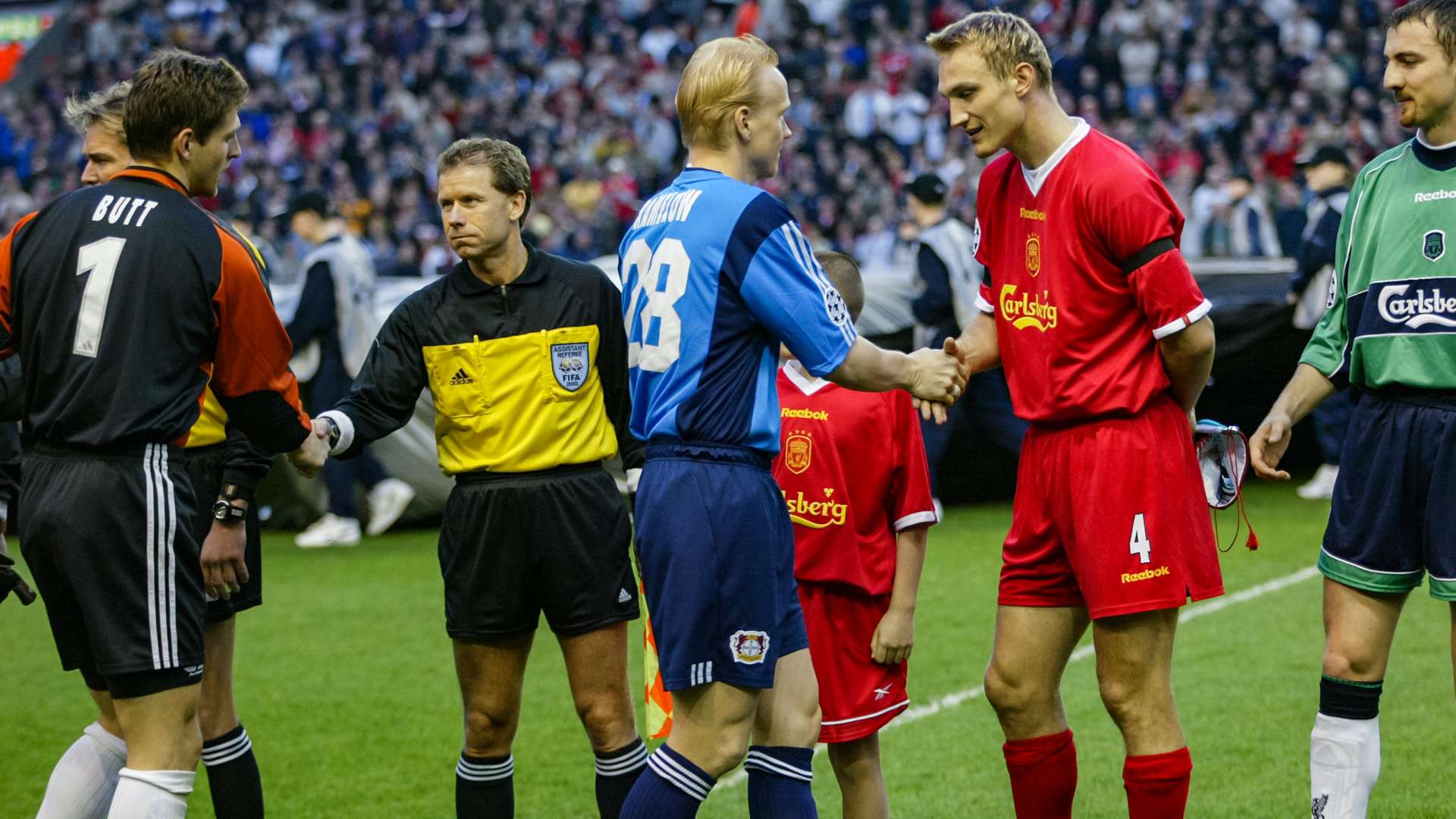
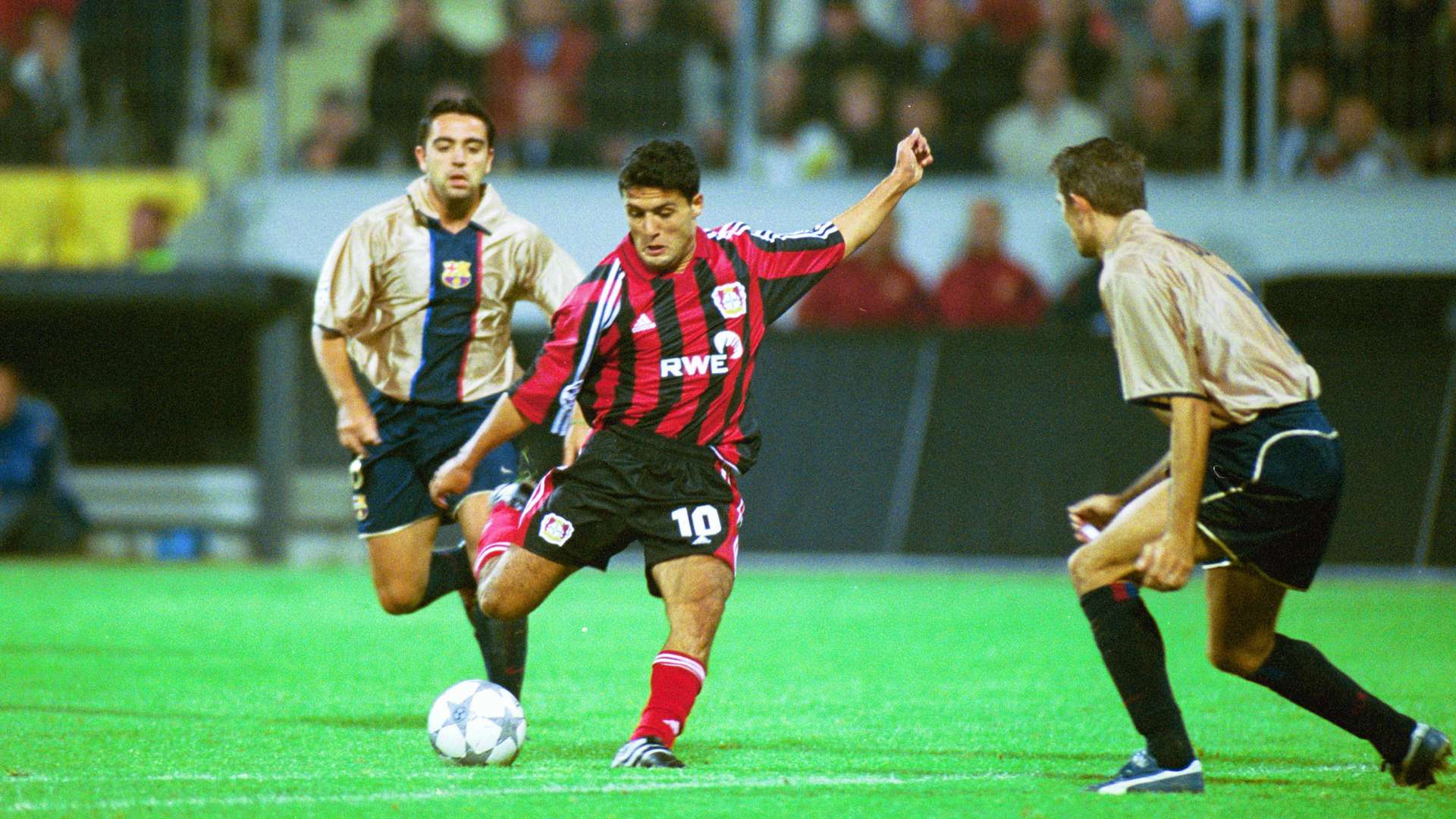
After two more world-class and energetic performances against Manchester United (2-2 and 1-1 draws to progress on away goals), Real Madrid once again awaited Bayer 04 in the final in Glasgow. “Despite a long season with many games, the team once again surpassed itself that evening,” recalls Werner Wenning. The chairman of the shareholders' committee of Bayer 04 Fußball GmbH was there at Hampden Park that night. “If we had managed to score a goal in the final phase, I'm convinced we would have won the final in extra-time,” says Wenning. “Bayer 04 has certainly gained many, many fans worldwide through its European matches in the 2001/02 season.”
There was something tragic about the fact that Leverkusen had surrendered a five-point lead with three games to go in the Bundesliga, had ‘only’ finished runners-up for the fourth time and had also failed to win the DFB-Pokal final against Schalke. And it was fitting that five Leverkusen players (Ballack, Schneider, Carsten Ramelow, Oliver Neuville and Jörg Butt) also finished runners-up with Germany at the subsequent World Cup in Japan and South Korea that summer.
A festival against the Galaticos
Less surprising, after so much drama, so much tension and so much footballing excellence, was that the team somewhat ran out of steam the following season. However, the squad, bosses and fans would have gladly done without another relegation battle. Yildiray Bastürk's goal in the 1-0 win at Nürnberg at the end of May 2003 ended the great fear on the last matchday. Bayer 04 had once again saved themselves.
Under Klaus Augenthaler, the 1990 World Cup winner, the team quickly stabilised again, qualifying for the Champions League in third place in the 2003/04 season. And they brushed aside Real Madrid 3-0 at the BayArena in the first group game on a unique evening. “The Galacticos had landed in Leverkusen in their UFO,” said midfielder Paul Freier with a grin, recalling a fantastic match for his team. “And who they had on board: Zidane, Figo, Beckham, Raul, Ronaldo, Roberto Carlos, Casillas. It was madness. But we just had a day when everything went our way.” Jacek Krzynowek's strike from 25 yards, Franca and Dimitar Berbatov with the other goals, took a legendary team apart that evening. The Franca/Berbatov duo had already impressed with dream goals a few weeks earlier in the 4-1 win against Bayern. Another remarkable game. Combination football in perfection.
After a number of inconsistent seasons, it was another match against the record champions in 2009 that had fans on the edge of their seats at the alternative home ground in Düsseldorf (the BayArena was being rebuilt). On the way to the cup final in Berlin, the Werkself led by captain Simon Rolfes and centre-forward Stefan Kießling knocked Bayern out of the competition with a 4-2 win in a battling quarter-final tie. After the subsequent extra-time victory against Mainz (4-1), Bayer 04 lost its third DFB-Pokal final 1-0 at the Olympiastadion against Werder Bremen. Bruno Labbadia was succeeded as the new coach by Jupp Heynckes.
The former striker and renowned coach set a new record start with his team. The Werkself were not only top and unbeaten midway through the 2009/10 season, but also remained undefeated over the first 24 matchdays. In the end, they finished fourth after a mixed second half of the campaign. In his second year at the helm, Heynckes led the Werkself to their fifth runner-up finish in the club's history in 2011 - and a return to the Champions League for the first time in seven years.
Bayer 04 in Europe – from “awesome” to “gigantic”
Since then, Bayer 04 has always qualified for Europe, with one exception in 2017/18. And it’s provided its fans with many more great European nights, both at home and away. For example, the thrilling, highly emotional clashes with Atletico Madrid in the Champions League in spring 2015. Rolfes, for whom this match was the last continental game of his career, remembers an “extremely heated atmosphere” in the round of 16 second leg at the old Vicente Calderon. “In sporting terms, we were absolutely on an equal footing. It was impressive to see how brutally Atletico played for results, what a mentality that team had. The fact that we lost the penalty shootout made me sad.”
Or the 4-4 draw against Roma in October 2015, which Jonathan Tah has special memories of: “That was a really crazy game in which things really got going. I found it very emotional and, as a 19-year-old at the time, I thought to myself: ‘Awesome, this is what the Champions League feels like, I always want that’.”
And let's not forget the 1-0 win at Wembley against Tottenham Hotspur a year later in November 2016, Bayer 04's first ever triumph in England. “We were blown away by the crowd at Wembley,” said former Werkself keeper Bernd Leno. “85,000 spectators, including a few thousand from Leverkusen - it was gigantic.”
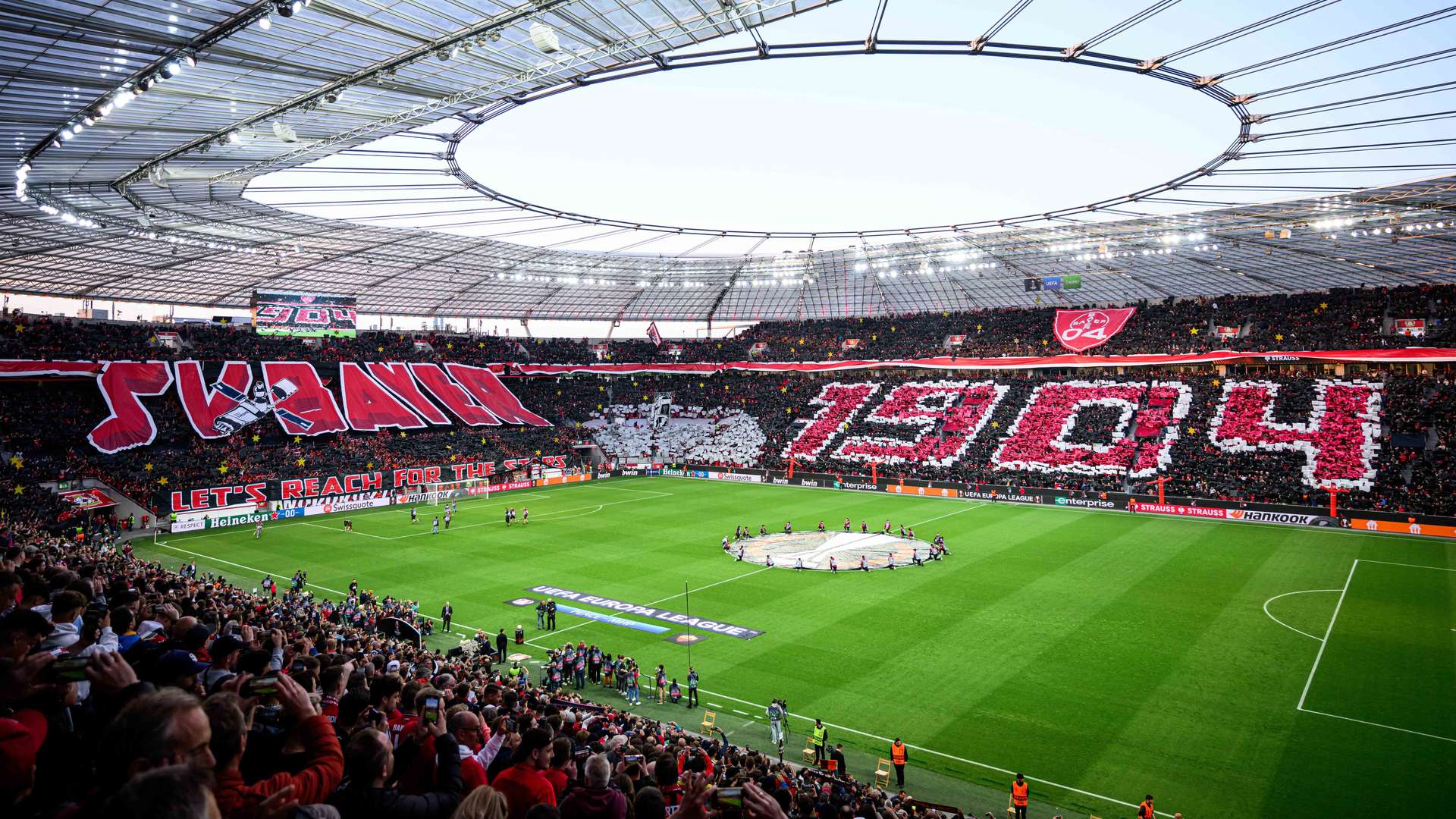
Last season's tour of Europe was also phenomenal and still fresh in the memory: the penalty shootout win at Monaco, the two 2-0 victories against Ferencvaros in the round of 16, the 4-1 victory in the quarter-final second leg at Union Saint-Gilloise. And finally, the great battle against the unfortunately successful and time-wasting Roma in the semi-final second leg exactly 35 years to the day after the 1988 UEFA Cup triumph. The dream of reaching the final again did not materialise.
But this season, Xabi Alonso's team is making a new attempt. And not just in the Europa League, in which Bayer 04 confidently progressed to the round of 16 after six wins from as many group games. “It's not just a dream,” said Patrik Schick about the chances of achieving something big this year. “At the moment, we're in a really good position in all competitions. Of course, we're fighting for titles - it's just hard to say which ones.”
Hopefully there will be no lack of feelings of happiness under the Cross in the coming weeks and months.
Part 3 - Social commitment under the Cross: sustainable assistance
Part 2 - Fans under the Cross: No journey too far
Part 1 - Stars under the Cross: World champions, performers, grafters
